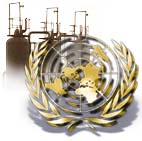US Senate Committee slanders Russian politicians
It seems that Washington is quick to make allegations and then when the time comes to back them up, it falls flat on its face
It is time for accusations. With George Bush's regime free-falling in the popularity polls, Washington looks abroad to focus the attention of the US citizens on something other than the dire social and economic situation in the USA. With Washington's external policy failing in Iraq, with world public opinion inflamed against the arrogance of a murderous military campaign against civilians, where else to turn but Moscow, traditionally an excellent source of bad news stories?
Basing a substantial part of its information on declarations by former Iraqi members of government, the Senate Permanent Subcommittee on Investigations now compiles a dossier against Russian former presidential aides Alexander Voloshin and Sergei Issakov, and the MP Vladimir Zhirinovsky, who it accuses of being involved in the Iraqi oil-for-food scandal, receiving hand-outs in return for favours. Last week it accused British MP George Galloway and the former French Minister of the Interior Charles Pasqua of being involved in the same scandal, accusations which both vehemently deny. But which was the country monitoring Iraq closely all through the 1990s? Which was the country conducting almost daily acts of piracy and terrorism inside Iraq? Which was the country which knew that around 8 billion USD-worth of Iraqi oil was smuggled out through Syria and NATO member, Turkey? Was it Russia or the United States of America?
And what are the accusations? That Russian officials received allocations of oil which they could sell for a huge profit? What are the sources? Iraqi officials living under the influence of the US puppet regime in Baghdad, who would say anything if they thought it would improve their interests and US oil company Bayoil, whose managers were indicted in April. Hardly reliable sources of information.
Based on hearsay, the Subcommittee report goes on to allege that the Russian presidential Council, led by Voloshin could have received 16 million USD and Vladimir Zhirinovsky, 8.7 million.
But where is the evidence that the payments were made? Where is the evidence that the money was received? It seems that Washington is quick to make allegations and then when the time comes to back them up, it falls flat on its face. Not so long ago, we were being told that Iraq posed an immediate threat to the USA and its allies and that Baghdad had Weapons of Mass Destruction. We were even told that Washington knew where they were. In Secretary Rumsfeld's words, in Baghdad and north, south, east and west of there.
Now we have allegations against Russian public figures. The position of the Russian Foreign Ministry is to wait until the UNO completes a thorough investigation. Until then, any talk by Washington is hearsay and given the recent record of George Bush's USA, it is not very convincing.
Making unfounded and untrue allegations amounts to slander. Perhaps it is time for accusations to be made the other way, that the USA attacked a sovereign nation illegally outside the auspices of the UNO, such an attack needed a separate and fresh resolution under the UN Charter, which Washington broke, along with the Geneva Convention while up to 100.000 people were slaughtered in the most shocking act of butchery since Vietnam.
What does the Subcommittee have to say to that?
Subscribe to Pravda.Ru Telegram channel, Facebook, RSS!





